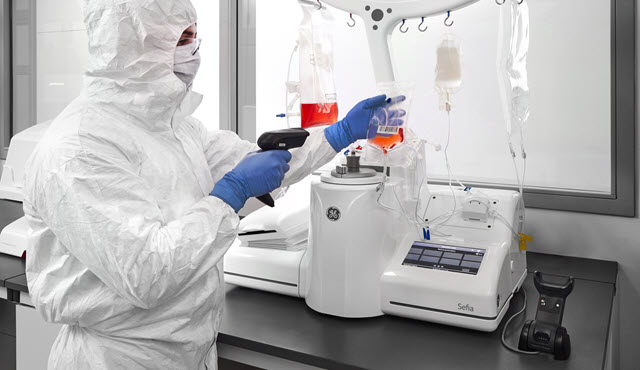GE Healthcare Launches Multifunctional Cell Processing System
Many of the cell therapy manufacturing process steps remain largely disconnected and require a human operator to manually transfer cells from step to step
 GE Healthcare Life Sciences launches the Sefia S-2000 cell processing system, a multifunctional technology allowing operators the flexibility to conduct multiple cell therapy manufacturing steps with one instrument. The Sefia instrument paired with dedicated software and disposable kits enables operators to set the software to automate an individual cell processing step or a series of steps.
GE Healthcare Life Sciences launches the Sefia S-2000 cell processing system, a multifunctional technology allowing operators the flexibility to conduct multiple cell therapy manufacturing steps with one instrument. The Sefia instrument paired with dedicated software and disposable kits enables operators to set the software to automate an individual cell processing step or a series of steps.
Many of the cell therapy manufacturing process steps remain largely disconnected and require a human operator to manually transfer cells from step to step, leading to more opportunities for contamination. Automating steps can limit the need for operator interactions and therefore assures higher sterility and reduced opportunities for contamination—this is particularly critical for manufacturers who are processing living cells for therapeutic treatment. To allow for flexibility and more seamless transitions between steps, GE Healthcare developed Sefia S-2000, which streamlines the isolation, harvesting, and final formulation steps in the cell therapy manufacturing process.
This next generation Sefia system maintains a temperature-controlled environment, allows operators to perform centrifuge-based processes of up to 10L of cellular product, and features weight sensors that automatically measure product volume. Also, its embedded computer system runs process automation and tracks data throughout the procedure. Sefia S-2000 integrates with GE Healthcare’s start-to-finish manufacturing platforms, including FlexFactory for cell therapy.
“Since cell therapy manufacturing involves processing live patient cells for therapeutic treatment, minimizing contamination and other risk elements is a key concern for manufacturers,” said Ger Brophy, general manager of Cell and Gene Therapy, GE Healthcare Life Sciences. “While many technologies currently used in cell processing were originally intended for other uses, Sefia S-2000 is an example of new technology developed specifically for cell therapy manufacturing applications to enable more control over safety and quality.”
About GE Healthcare
Harnessing data and analytics across hardware, software and biotech, GE Healthcare is the $18 billion healthcare business of GE (NYSE: GE). As a leading provider of medical imaging equipment, with a track record of more than 100 years in the industry and more than 50,000 employees across 100 countries, we transform healthcare by delivering better outcomes for providers and patients. Follow us on Facebook, LinkedIn, and Twitter or The Pulse for latest news.
